| Srl | Item |
| 1 |
ID:
157934
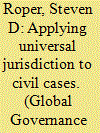

|
|
|
|
|
| Summary/Abstract |
The principle of universal jurisdiction allows a state to exercise jurisdiction over a category of cases when the state has no connection by territory, nationality, or other interest with the parties. While the concept of universal jurisdiction is not new, it has been almost exclusively applied to criminal matters. There has been relatively little focus on the application of universal jurisdiction in the civil sphere as a means for victims to seek judgments and compensation for serious violations of human rights. This article examines the theoretical distinction made by courts in the application of universal jurisdiction to civil cases and explores why the emerging norm of universal jurisdiction has been focused almost exclusively on criminal matters. The article surveys the status of universal civil jurisdiction in US and European courts, examines how jurisdiction is limited by courts, and assesses the arguments for and against a civil basis of universal jurisdiction.
|
|
|
|
|
|
|
|
|
|
|
|
|
|
|
|
| 2 |
ID:
156237
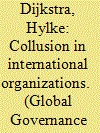

|
|
|
|
|
| Summary/Abstract |
In the theoretical literature on the authority of international secretariats, academics often dichotomize between states and secretariats. Even when they account for the fact that states are often divided, they normally adopt a two-step approach: states first resolve their own differences before they entertain relations with secretariats. This article provides an alternative perspective. It argues that individual or groups of states may collude with like-minded secretariats to achieve outcomes at the expense of other states. Working informally together is beneficial. States can benefit from the rational-legal, delegated, moral, and expert authority of secretariats. States and secretariats can also exchange resources. The article illustrates this perspective through two case studies: the NATO intervention in Libya in 2011 and the European Union's military operation in Chad in 2008.
|
|
|
|
|
|
|
|
|
|
|
|
|
|
|
|
| 3 |
ID:
156232


|
|
|
| 4 |
ID:
157933


|
|
|
|
|
| Summary/Abstract |
A paradigmatic shift from carbon-intensive to alternative and renewable energy prompts the question of whether lessons learned in one era are forgotten in the next. Carbon-intensive industries (oil, gas, and coal) have not performed well on mitigating negative impacts on host community conflict, but alternative energy corporate actors can learn from them. Focusing on alternative energy companies, and specifically companies in supply chains for new-generation lithium-ion battery systems, this article illustrates companies' connections to conflict minerals and critical materials, and how a corporate peacebuilding strategy can address a company's impacts on conflict whether on the ground or through the supply chain. Companies reframing their corporate social responsibility to corporate peacebuilding, which includes peacemaking, are better prepared for expanding international conflict minerals and critical materials governance and emerging action on resource sustainable governance.
|
|
|
|
|
|
|
|
|
|
|
|
|
|
|
|
| 5 |
ID:
156236


|
|
|
|
|
| Summary/Abstract |
Over the course of a single generation, the international community has undergone a radical shift in its views on its collective obligation to address health in low- and middle-income countries. This shift toward accepting the need to respond to global health concerns is rhetorical, behavioral, and financial—and has been maintained even in light of the incredible economic issues and austerity policies that have faced high-income states since 2008. What explains this shift in the international community's sense of obligation and the necessity of actuating an effective response? This article argues that the role and prominence of global health governance within international society reflects its emergence as a secondary institution within international society.
|
|
|
|
|
|
|
|
|
|
|
|
|
|
|
|
| 6 |
ID:
156235
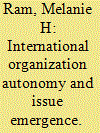

|
|
|
|
|
| Summary/Abstract |
How do international organizations (IOs) decide to address new issues? Most IO literature focuses on why states delegate to IOs and if, when, and how IOs are able to act autonomously. Less attention is paid to how IOs may use their autonomy to bring attention to new issues. This article theorizes about IO issue emergence using a qualitative case study of the advent of the World Bank's Roma inclusion agenda. By examining a case of issue emergence that appears to diverge from state demands, we can better understand how IOs exercise their autonomy and consequently shape global policy agendas.
|
|
|
|
|
|
|
|
|
|
|
|
|
|
|
|
| 7 |
ID:
156234
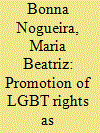

|
|
|
|
|
| Summary/Abstract |
One of the greatest contemporary challenges in human rights norm making is defining the protection against discrimination based on sexual orientation, gender identity, and gender expression as an international standard. In an unusually polarized structure, the approval of a few resolutions on the rights of lesbian, gay, bisexual, transvestite, transsexual, and transgender persons has engendered intense negotiation within international organizations, which has been largely promoted by Brazil. By expanding the analytical parameters of the literature on norm entrepreneurship to the study of foreign policy, the article analyzes Brazil's international leadership on LGBT rights, explaining the origins, motivations, and results of the country's proactive stance on the issue.
|
|
|
|
|
|
|
|
|
|
|
|
|
|
|
|
| 8 |
ID:
157932
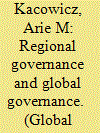

|
|
|
|
|
| Summary/Abstract |
This article examines the possible links between regional governance and global governance from a regional perspective. It presents and develops a typology of linkages that include: (1) irrelevance; (2) conflict; (3) cooperation; and (4) harmonic relations. Moreover, it suggests three alternative explanations to make sense of the linkages as a function of the nature of the issue area of regional and global governance, the role of pivotal states, and the importance of ideational factors and the diffusion of norms. It succinctly refers to the Latin American experience as an illustration of the nexus between regional governance and global governance in a comparative perspective.
|
|
|
|
|
|
|
|
|
|
|
|
|
|
|
|
| 9 |
ID:
156233


|
|
|